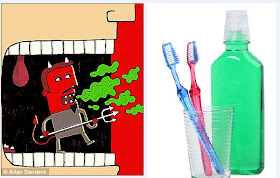Wednesday, 19 June 2013
Mouthwash can actually make bad breath even WORSE - Wow
You've brushed your teeth, used your floss - now for a nice swig of mouthwash. With people enticed by the idea of minty fresh breath and the promise of a clean mouth, sales of mouthwash have boomed in recent years.
Around 55 per cent of the public use a mouthwash, compared with just over 40 per cent in 2006, according to figures from researchers Mintel.
But while mouthwash is often marketed as a way to keep your mouth really clean and prevent gum disease, do we actually need it - and could it even undermine your dental hygiene?
Gum disease begins with plaque. This is a film of sticky bacteria on the teeth which, if not removed by brushing, irritates the gums, which then bleed and start to recede.
So can a mouthwash help? A study in the Journal of Clinical Dentistry earlier this year found swigging with an antiseptic mouthwash twice a day reduced the build-up of plaque and reduced gingivitis (inflamed gums) over six months.
The study group consisted of 139 people - half of whom were given mouthwash and the other half were given a placebo to swill with. The mouthwash group had substantially better results.
Yet opinions about the benefits of mouthwash vary.
'There is some evidence that using mouthwashes does have some clinical benefit in reducing levels of plaque - but only by a bit,' says Professor Damien Walmsley, scientific adviser to the British Dental Association.
'So I'd say although, yes, they are helpful, they are never going to be a replacement for the mechanical action of a toothbrush for getting teeth and gums clean.'
Others argue that spending around £4 a bottle on mouthwash is just not necessary to keep your teeth clean.
'If you have good oral hygiene - you brush your teeth well and floss - you have a low level of dental decay and don't suffer from gum disease or bad breath, then you are probably wasting your money,' says dentist Dr Phil Stemmer, of the Fresh Breath Centre in London.
The problem is some people think they can swill mouthwash rather than clean their teeth properly. 'Nothing could be further from the truth,' says Sally Goss, a dental hygienist at the Harley Street Dental Studio, London.
'I get a lot of new patients who think they are doing a fabulous job because they are using a mouthwash, but when I look in their mouth I see a different story - there is still tartar (hardened plaque) and signs of gum disease.
'Plaque is really sticky - you are only ever going to budge it from the teeth by using a brush or by pulling at it with dental floss. Mouthwash is never going to be a replacement for good brushing.'
And, if used incorrectly, mouthwash can even reduce the benefits of your toothpaste. 'Sometimes there can be an interaction between the chemicals in the toothpaste and chemicals in the mouthwash and this means they cancel out the benefits of each other,' says Dr Stemmer.
'That's why people should leave a least half an hour between brushing and using mouthwash.'
That's not the only reason to leave a gap between your brushing and mouthwash routine. 'We encourage people to spit out excess toothpaste when they have finished brushing, but not to rinse,' says Sally Goss.
'This is because toothpaste contains fluoride which strengthens the teeth, so leaving the residue of toothpaste means this fluoride stays around the teeth for longer and so helps make them stronger.
'If you then have only a brief gargle with a mouthwash straight after brushing, as many people do, you counter the benefits of the toothpaste and you don't get the full benefits of the mouthwash.
'Some mouthwashes do contain fluoride - and having both is great - but using a toothpaste is a more effective mode of delivery as you are applying it directly onto the tooth rather than swilling it round the mouth.'
She suggests using the mouthwash in the middle of the day when it will not interfere with the toothpaste. Swilling out the debris of lunch can reduce decay.
Another mistake people make when they use mouthwash is that they don't use it for long enough.
'Virtually every mouthwash comes with a recommendation that people swill it in their mouth for a minute,' says Sally Goss.
'That's because it takes that amount of time for the ingredients to work - otherwise it's just like swilling and spitting it all out.
'A minute is a long time to swill - your cheeks should be aching after you've done that for a minute. However when you watch people, few do it for that long.
'If you find that it stings if you do it this long, I'd suggest it's not the right mouthwash for you - everyone has different sensitivities. But if you don't find the time to use it properly, you really are wasting your money.'
Mouthwashes now come in many different forms. Most contain alcohol (between 21 and 26 per cent). 'Alcohol is often included, as it helps make the active ingredients effective - so without alcohol, the anti-bacterial action would not work, for example,' says Professor Walmsley.
However, a study in 2009 linked this to mouth cancer, although subsequent research has not managed to back up those findings. 'There has been no evidence for that,' adds Professor Walmsley
Thank God for this information, because I use I too.


Thank you so much Jesika for your comment, I truly appreciate it. I will take notice of all you have said. Thanks again.
ReplyDeleteTreatment for reversing gum disease usually focuses on removing the plaque buildup in the teeth to restore your mouth to its previous healthy state.
ReplyDeleteThanks for the comment.
DeleteThere is so many long lasting mouthwash. We can choose from a wide range.
ReplyDelete